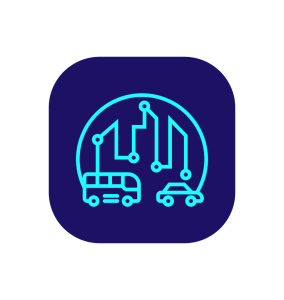Munich.
Challenge
How can individual mobility patterns in a city like Munich be identified
based on a data model?
CURRENT SITUATION
The city of Munich with 1,5 million inhabitants is facing environment and traffic challenges due to growing numbers of inhabitants and of private vehicles causing an increase in CO2 emissions. Approximately 400.000 commuters from surrounding areas come to Munich daily. To adapt to the passengers’ needs and to improve SWM/MVG’s offer it is crucial to know how passengers use the public transport and other means of transport in order to attract more people to environmentally friendly modes.
Currently there is only data available that is evaluated/collected from counting devices installed in Public Transport which can count passengers getting on and off the subway/bus/tramway at the stations. There is no evaluation of other means of transport. Only 15-60% of all public transport vehicles are equipped with counting devices. This is why only long-term average values can be calculated whereas specifications for a certain day/date are not possible. Mobile providers can show streams of movement almost in real time, but do not record short distances (under 1 km) and are not able to differentiate the means of transport. App based solutions very often have the problem that there are not enough users and in addition to that, those users are not representative for the residential population and tourists. The correct projection therefore is hardly possible.
How does success look like?
- Methods to evaluate the available data to answer the questions above are found
- Data from different sources and providers, including data of the automatic counting systems of the MVG, are combined and data quality is ensured
- Concept of how to combine data of different sources to reach the above mentioned goals
- Proof of concept with real or generated, near-reality data
How success could be measured?
- Solution is tailored to the requirements of SWM (City Utilities public company of Munich) and the City of Munich
- Number of modes of transport identified
- Number of different time-slots covered (workdays, Saturdays, Sundays,…)
- Roadmap for implementing the concept is set up

Solution
Transcality digitises infrastructure systems in the form of digital transportation twins – for operations and planning. The solution can be used for scenario management, forecasting of traffic flows, visualisation of historical, current and forecast traffic conditions.
Results
- A digital twin, as a multi-modal simulation model of Munich, was developed and deployed.
- Using historical passenger count data and existing static macroscopic model of the public transportation operator of Munich (MVG) were analysed and a more detailed mesoscopic model was created and calibrated. This means that the output of this model can guarantee seamless integration into the current input/output flow of MVG.
- The developed concept can provide deep insights on travel behaviour in Munich including how many people, at what time of day, and via which mode of transportation travel from one location to another.


